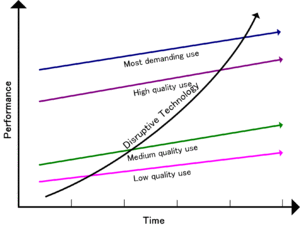IN AN ERA DEFINED BY INSTABILITY, SOCIETY MUST REMAIN IMMINENTLY FLEXIBLE AND TURN DISRUPTION INTO A FORCE FOR GOOD
Joshua Cooper Ramo, managing director of Kissinger Associates, believes that we live in a “revolutionary age” defined by problems whose complexity, unpredictability, and interconnectedness increasingly defy our efforts at control. Global threats such as terrorism, pandemics, financial meltdown, and climate change, according to Ramo, demand a systems perspective that draws upon chaos science, complexity theory, and the theory of disruptive innovation. In his 2009 book, The Age of the Unthinkable, he calls for nothing less than a “complete reinvention of our ideas of security,” even the reversal of a “couple of millennia of Western intellectual habits.”
Why have you dubbed the current era the “age of the unthinkable?”
Three reasons. First, all you have to do is pick up a newspaper and every day you find things that would have been unthinkable even a few years ago: 10 percent unemployment, the financial crisis, China holding $2 billion in US debt. But the second reason this is the age of the unthinkable is that our best minds and best ideas often not only fail, they backfire: Trying to make the world more prosperous by spreading capitalism makes it more unstable and often more unequal; the most expensive war on terror creates in the end more dangerous terrorists; even Greenspan confesses to being “shocked” that his ideas aren’t working. And finally, it’s the age of the unthinkable because many of the very forces destabilizing the world give each of us a really profound chance to change, shape, and do decent things in the world.
You’ve often invoked a pile of sand as a metaphor for today’s complex world. What do you mean by that?
Think of a pile of sand, with additional grains being added every second or so. Scientists say such a pile is “organized into criticality,” since at any moment it can have a little avalanche as the sides get steeper. But the system is so complex that it can’t be modeled completely and—this is important—it’s nonlinear in that it can suffer a change in state under both big blows and tiny hits, like the addition of a single new grain of sand. That’s our world: Every second it gets more complex, like a sandpile. New financial instruments, terror groups, viruses, and innovations are ceaselessly falling onto our pile, making it really complex to model and basically impossible to predict. Small things—home mortgages—can have huge impacts. Usually by surprise. One thing I learned from writing the book and hanging out with people ranging from Hizb’allah terrorists to the guys who started Google is that it is possible to use this sort of cascading power to make tremendous changes. And since this kind of dynamic is inevitable, the challenge is to make positive avalanches.










